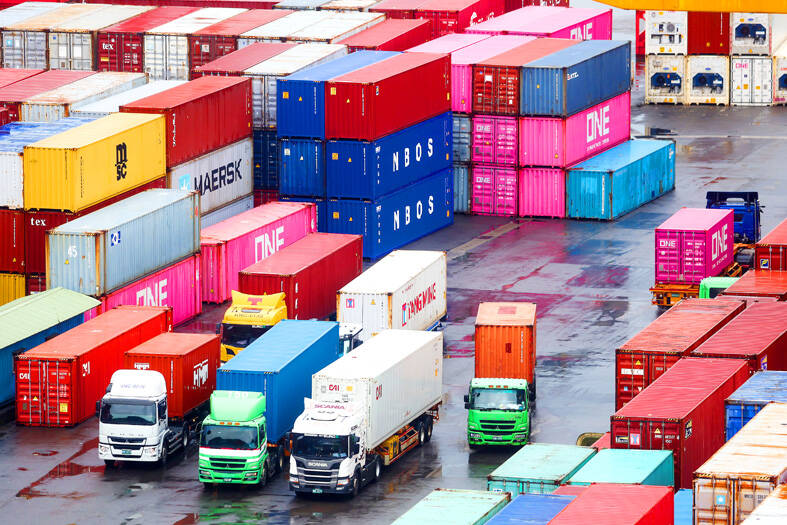Taiwanese exports last month surged to an all-time high, buoyed by robust global demand for artificial intelligence (AI) technologies, early stocking of next-generation mobile devices and accelerated shipments ahead of potential US tariff changes, the Ministry of Finance said yesterday.
Outbound shipments rose 23.5 percent year-on-year to US$53.32 billion, marking the 20th straight month of expansion, led by advanced tech components and high-end servers used in AI applications, Department of Statistics Director-General Beatrice Tsai (蔡美娜) told a news conference in Taipei.
“The performance can only be described as red-hot, bucking the usual seasonal lull,” Tsai said.

Photo: CNA
The strong momentum is expected to extend into this month, with export growth projected at 15 to 20 percent based on recent imports of key electronic components intended for exports, she said.
Technology products remained the dominant force, with electronics and information and communications technology (ICT) goods accounting for more than 72 percent of total exports.
Orders for high-performance chips and AI servers soared, fueled by a global surge in data center investment, Tsai said.
The US overtook China as Taiwan’s largest export destination last month for a second straight month, as American tech giants — Amazon.com Inc, Microsoft Corp and Google parent Alphabet Inc — ramped up spending on AI infrastructure, she said.
The shift also reflects ongoing realignment in the global tech supply chain, as Taiwanese firms comply with US restrictions on advanced tech exports to China, she said.
While tech exports powered ahead, traditional industries continued to lag. Textiles, plastics, chemicals and transport equipment all posted year-on-year declines, pointing to persistent weakness in broader global demand and excess supply in some sectors, Tsai said.
Meanwhile, imports last month rose 17.3 percent to US$41.26 billion, driven largely by surging purchases of capital equipment, the ministry said.
Semiconductor firms led the way, with spending on production tools soaring 90.4 percent from a year earlier.
The resulting trade surplus widened 157 percent to US$12.07 billion, evidence that Taiwan needs to try harder to appease Washington in tackling trade imbalances. The AI boom has been a key driver of Taiwan’s strong trade performance.
Second-quarter exports jumped 34.1 percent — outpacing government forecasts by nearly 7 percentage points — indicating upside risk to GDP growth projections, the ministry said.
For the first half of the year, exports rose 25.9 percent to US$283.26 billion, while imports climbed 20.5 percent to US$227.56 billion.
Among Asia’s key exporters, Taiwan posted the fastest year-on-year growth, outperforming China, South Korea, Japan and Singapore.
Still, the ministry warned of potential headwinds in the second half, citing lingering uncertainties over US tariffs, global interest rate policies, and possible weakness in consumer electronics demand.

Nvidia Corp chief executive officer Jensen Huang (黃仁勳) on Monday introduced the company’s latest supercomputer platform, featuring six new chips made by Taiwan Semiconductor Manufacturing Co (TSMC, 台積電), saying that it is now “in full production.” “If Vera Rubin is going to be in time for this year, it must be in production by now, and so, today I can tell you that Vera Rubin is in full production,” Huang said during his keynote speech at CES in Las Vegas. The rollout of six concurrent chips for Vera Rubin — the company’s next-generation artificial intelligence (AI) computing platform — marks a strategic

Enhanced tax credits that have helped reduce the cost of health insurance for the vast majority of US Affordable Care Act enrollees expired on Jan.1, cementing higher health costs for millions of Americans at the start of the new year. Democrats forced a 43-day US government shutdown over the issue. Moderate Republicans called for a solution to save their political aspirations this year. US President Donald Trump floated a way out, only to back off after conservative backlash. In the end, no one’s efforts were enough to save the subsidies before their expiration date. A US House of Representatives vote

REVENUE PERFORMANCE: Cloud and network products, and electronic components saw strong increases, while smart consumer electronics and computing products fell Hon Hai Precision Industry Co (鴻海精密) yesterday posted 26.51 percent quarterly growth in revenue for last quarter to NT$2.6 trillion (US$82.44 billion), the strongest on record for the period and above expectations, but the company forecast a slight revenue dip this quarter due to seasonal factors. On an annual basis, revenue last quarter grew 22.07 percent, the company said. Analysts on average estimated about NT$2.4 trillion increase. Hon Hai, which assembles servers for Nvidia Corp and iPhones for Apple Inc, is expanding its capacity in the US, adding artificial intelligence (AI) server production in Wisconsin and Texas, where it operates established campuses. This

US President Donald Trump on Friday blocked US photonics firm HieFo Corp’s US$3 million acquisition of assets in New Jersey-based aerospace and defense specialist Emcore Corp, citing national security and China-related concerns. In an order released by the White House, Trump said HieFo was “controlled by a citizen of the People’s Republic of China” and that its 2024 acquisition of Emcore’s businesses led the US president to believe that it might “take action that threatens to impair the national security of the United States.” The order did not name the person or detail Trump’s concerns. “The Transaction is hereby prohibited,”